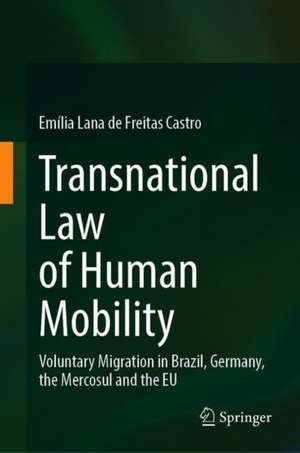Transnational Law of Human Mobility: Voluntary Migration in Brazil, Germany, the Mercosul and the EU
Autor Emília Lana de Freitas Castroen Limba Engleză Hardback – aug 2020
This book employs methods from comparative law to analyze voluntary migration, exploring the free movement of immigrants and their freedom of settlement under Brazilian and Mercosul law, as well as under German law and the European Union’s legal framework on migration. It discusses the level of protection granted to immigrants in terms of their right to enter and stay in Brazil and Mercosul, using German legislation and the EU’s legal framework on migration for comparison. Accordingly, the book will help migration researchers to understand not only the structure and rationale of migration law in Brazil, especially after the entry into force of its recent Migration Law in 2017, but also its relation to EU and German provisions on voluntary migration. It demonstrates how the differing natures of the migration law adopted by Brazil and Germany have led to different approaches and, consequently, different levels of protection for immigrants.
| Toate formatele și edițiile | Preț | Express |
|---|---|---|
| Paperback (1) | 638.43 lei 6-8 săpt. | |
| Springer International Publishing – 2 aug 2021 | 638.43 lei 6-8 săpt. | |
| Hardback (1) | 644.63 lei 6-8 săpt. | |
| Springer International Publishing – aug 2020 | 644.63 lei 6-8 săpt. |
Preț: 644.63 lei
Preț vechi: 758.38 lei
-15% Nou
Puncte Express: 967
Preț estimativ în valută:
123.34€ • 128.80$ • 101.86£
123.34€ • 128.80$ • 101.86£
Carte tipărită la comandă
Livrare economică 15-29 aprilie
Preluare comenzi: 021 569.72.76
Specificații
ISBN-13: 9783030466077
ISBN-10: 3030466078
Ilustrații: XII, 242 p. 1 illus.
Dimensiuni: 155 x 235 mm
Greutate: 0.54 kg
Ediția:1st ed. 2020
Editura: Springer International Publishing
Colecția Springer
Locul publicării:Cham, Switzerland
ISBN-10: 3030466078
Ilustrații: XII, 242 p. 1 illus.
Dimensiuni: 155 x 235 mm
Greutate: 0.54 kg
Ediția:1st ed. 2020
Editura: Springer International Publishing
Colecția Springer
Locul publicării:Cham, Switzerland
Cuprins
1 Introduction.- 2 On the Legal Nature of Migration Law in Brazil, Germany and the European Union.- 3 Historical Aspects of Migration in Brazil and in Germany.- 4 The Legal Framework of Migration in Brazil and in MERCOSUL.- 5 The Legal and Normative Framework on Migration in Germany and in the European Union.- 6 Conclusions and Recommendations.
Notă biografică
The author is a graduate of Rio de Janeiro State University’s Law School (Universidade do Estado do Rio de Janeiro – UERJ), where she also received her Master of Law in International Law. Emília Castro completed her PhD (magna cum laude) in October 2019 at Universität Hamburg (Germany). She is admitted to the Brazilian Bar Association since 2012 and worked as an Assistant Lecturer for Private International Law at UERJ and as an Assistant Lecturer for Brazilian Private International Law at Universität Hamburg. The author has experience working in gas and energy law in Brazil, and is currently working with global transactions in Berlin, Germany.
Textul de pe ultima copertă
This book employs methods from comparative law to analyze voluntary migration, exploring the free movement of immigrants and their freedom of settlement under Brazilian and Mercosul law, as well as under German law and the European Union’s legal framework on migration. It discusses the level of protection granted to immigrants in terms of their right to enter and stay in Brazil and Mercosul, using German legislation and the EU’s legal framework on migration for comparison. Accordingly, the book will help migration researchers to understand not only the structure and rationale of migration law in Brazil, especially after the entry into force of its recent Migration Law in 2017, but also its relation to EU and German provisions on voluntary migration. It demonstrates how the differing natures of the migration law adopted by Brazil and Germany have led to different approaches and, consequently, different levels of protection for immigrants.
Caracteristici
The first work in Europe on the Brazilian migration law of 2017 Offers a unique comparison of Brazilian migration law with German and EU law Explains the Brazilian approach of considering the status of foreigners as a private international law issue
